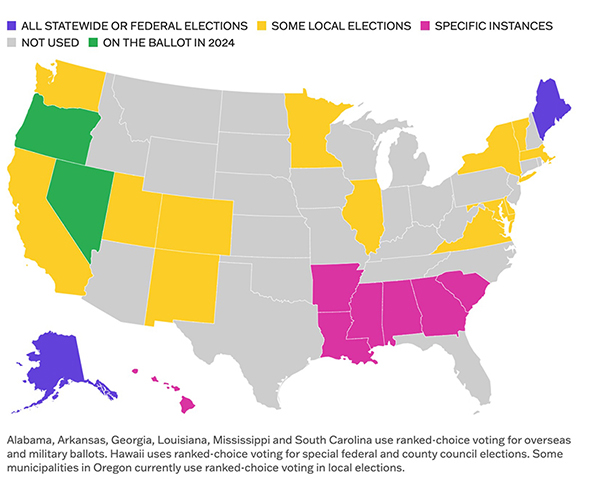

Many political observers think that first-past-the-post elections, especially with no runoff, are driving polarization all over the country. If half a dozen candidates are running in a primary and one of them can turn out the 25-30% who are real zealots, he or she can win. In response, there is a palpable trend toward ranked-choice voting, which helps candidates who can appeal to more than a narrow core of fanatics. Moderate Republicans and Democrats who can pull second-choice votes from the other party tend to do well with ranked-choice voting, as we have seen in Alaska, where Rep. Mary Peltola (D-AK) and Sen. Lisa Murkowski (R-AK) have won ranked-choice elections with help from voters who belong to the other party.
And so, the system is (potentially) spreading. In 2024, initiatives in Nevada and Oregon will let the voters choose ranked-choice voting for future elections if they so desire. Here is a map showing where ranked-choice voting is already in use.

As you can see, while only two states, Alaska and Maine, use it statewide, in many states it is used in some local elections or in specific circumstances. In six states in the South, it is used for overseas ballots because there is no time to send runoff ballots overseas and get them back on time. Ranked-choice voting solves the problem since each ballot is counted in the runoff as a vote for the candidate ranked the highest who is still in the running. The alternative name for ranked-choice voting is instant-runoff voting, which indicates it can be used for runoffs.
In one state that already has RCV, Alaska, opponents of it are working on a ballot initiative to get rid of it. These are right-wing Republicans who don't like the system because with it, candidates who appeal to 30% of the voters on the far right, and no one else, can't win statewide. If RCV is abolished, then that "problem" will be solved, or at least mitigated.
In Nevada, the voters already approved RCV in 2022, but the state Constitution requires citizen-initiated ballot measures to be approved twice, so the voters will be asked again in 2024. The measure has a mixed bag of opponents, including both U.S. senators, the influential culinary union, and several right-wing groups. They argue that the voters are too stupid to be able to mark candidates as 1-2-3. The measure passed with 53% of the vote in 2022, so its passage in 2024 is not a sure thing.
The situation in Oregon is different. It was put on the ballot by the state legislature, which is controlled by the Democrats, indicating broad establishment support. Also, some cities and counties there already use RCV, so those voters are already familiar with the system (V).